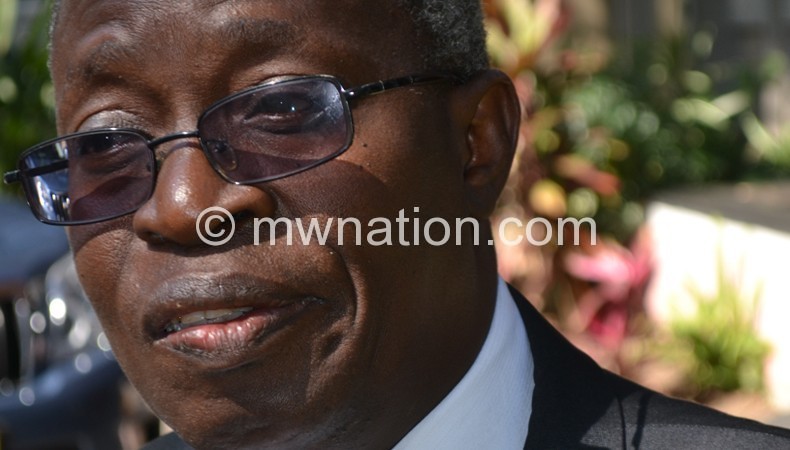Supreme Court clarifies on death penalty
The Malawi Supreme Court of Appeal has clarified that Malawi never abolished the death penalty and that High Court judges are free to sentence murder convicts to death.
The initial assertion followed what the Judiciary is now describing as “unperfected Supreme Court judgement” written by Justice of Appeal (JA) Dunstain Mwaungulu (now retired) on behalf of his colleagues in April 2021 which held that the court had declared the death penalty unconstitutional.
The latest majority opinion of the highest court on the land has since decided otherwise and blamed their colleague for the judgement, saying that the purely constitutional issues of whether to abolish the death penalty were never brought before the court for consideration.
But Mwaungulu, who sounded shell-shocked with positions taken by his colleagues to disown the judgement and disassociate themselves from the same, yesterday said he wrote the judgement two years ago and submitted a draft copy to his colleagues for their opinion which, he said, never came.

In an interview from the United Kingdom, he said the Supreme Court in April this year read his judgement which he claimed was collective and was penned after they discussed the case.
Mwaungulu said: “My colleagues are the best people you should ask. What I gave them was my draft copy. But they read it and gave it to the public as the position of the court. I now see their opinions inserted in the judgement I wrote. I was entitled to see their opinions before this was made public; that never happened.
“Ask them. They read my judgement in my absence, but I was never shown their opinions that are coming now, why this change of heart?”
So as it stands and this controversy aside, commit murder at your own peril. Do not rejoice yet if you are on death row because High Court judges, going by the recent Supreme Court judgement, can still flex their muscles and impose a death sentence which judges at the Supreme Court have unanimously agreed was never abolished.
The country’s President would, one day, if he decides so, be at liberty and within his authority as backed by the law, to sign for death warrant certificates.
So too, one judge, based on mitigating factors presented in a murder trial, could impose sentences other than death or life imprisonment, say 20 or 30 years jail terms, for example.
What has come out so clearly in the latest Supreme Court decision is that in a 2007 Kafantayeni and others versus the Attorney General (AG) case, a three-judge panel of the High Court never abolished the death penalty; rather it abolished the mandatory death sentence.
This meant that depending on aggravating factors, you would still have a High Court judge imposing a death penalty, with others opting for custodial sentences differing in number of years.
Supreme Court judges that formed a seven-member panel—Chief Justice Andrew Nyirenda, Rezine Mzikamanda, Anaclet Chipeta, Lovemore Chikopa, Frank Kapanda and Edward Twea—disowned and disassociated themselves from Mwaungulu’s findings that the court abolished the death penalty.
In an interview yesterday, Malawi Law Society (MLS) president Patrick Mpaka agreed with this interpretation of the law by the Supreme Court, saying that the death penalty was never abolished in the High Court or in the latest decision of the Supreme Court.
But what led to this clearly controversial judgement from the highest court on the land?
Top-level sources within the Judiciary disclosed that Mwaungulu was tasked to write the judgement on behalf of his colleagues after a murder convict, Charles Khoviwa, appealed to the Supreme Court that he be considered to benefit from what his fellow prisoners were benefitting through the Francis Kafantayeni project to have a rehearing of his case,
The two sources who corroborated the story said the summarised judgement, which Mwaungulu initially presented to his colleagues, did not have elements that suggested death penalty was abolished, but rather the declaration that the Supreme Court abolished death penalty appeared in the final copy that came out in April 2021.
But this, according to the sources, shocked his colleagues and they worked on amendments that led to this latest decision in which the majority opinion disowned declarations by Mwaungulu that the court declared the death penalty unconstitutional.
Mpaka said the Kafantayeni case did not abolish the death sentence, so too is the case in the latest decision by the Supreme Court.
He said: “Kafantayeni case abolished the mandatory death penalty. It abolished the mandatory death sentence. Under the law, it is the majority opinion of the Supreme Court that is binding, authoritative and precedent setting.
“And under the law, judges do not make law except by deciding on specific questions before them. With this clarification of the Khoviwa decision by the majority of the Supreme Court, it means as a country, we still have the death penalty as part of our law as contained in the Penal Code and recognised by Section 16 of the Constitution.”
Nyirenda, said in the latest judgement that Mwaungulu had taken an opportunity to go beyond what was really on appeal and pronounced on constitutionality of the death penalty itself, [which was the matter not before the court].
Human rights activists praised the Malawi Judiciary when news filtered in that the death penalty had been abolished. That joy is now short-lived.
Former president Bakili Muluzi, who ruled the country from 1994 to 2004, is on record as having refused to sign for death warrant certificates.
His successors—Bingu wa Mutharika, Joyce Banda and Peter Mutharika—did also not sign a death warrant. So too the incumbent Lazarus Chakwera has not signed any.
More than 30 countries in Africa have the death penalty in their books, but just half carried out executions in recent years.






One Comment